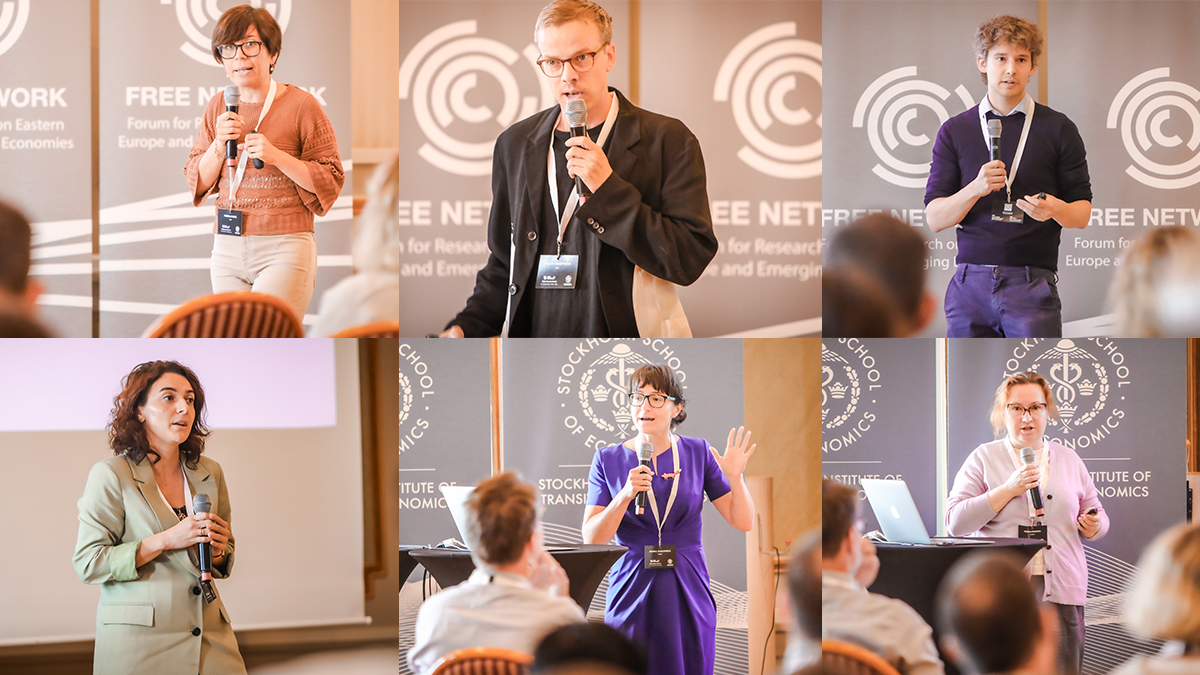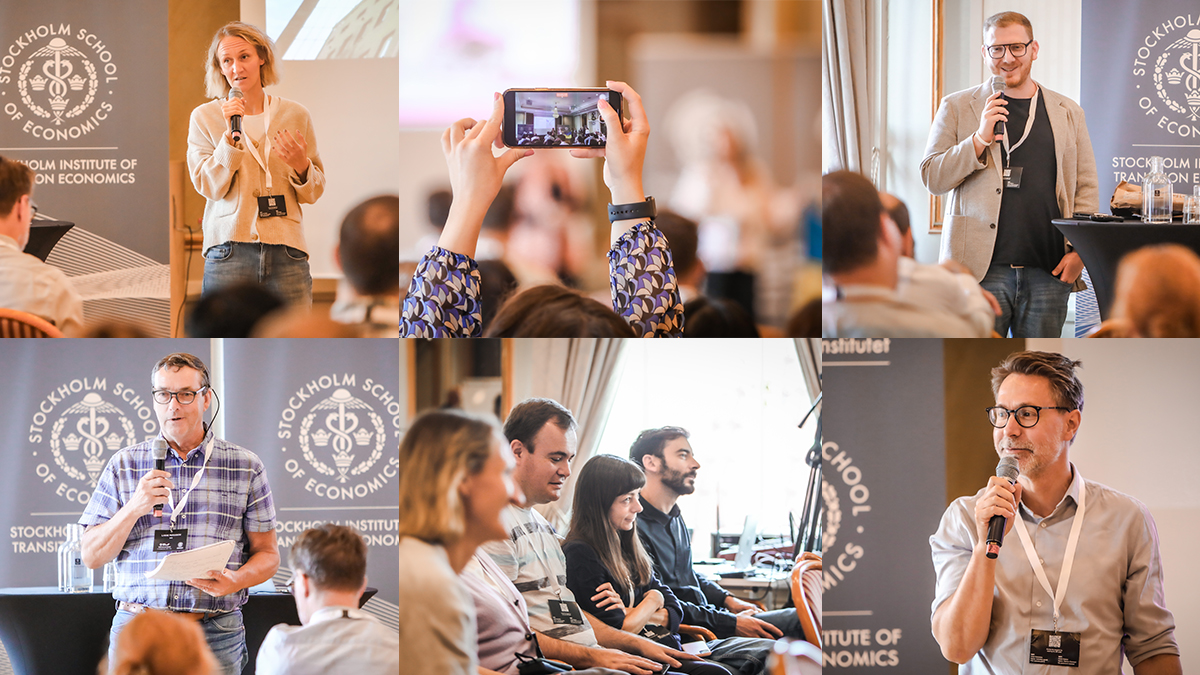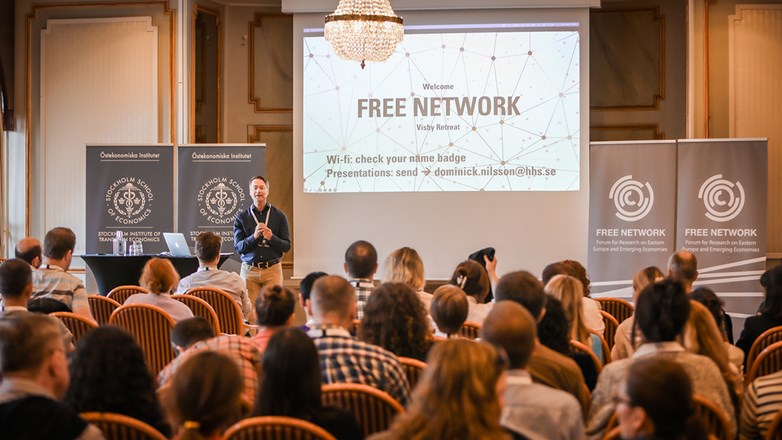Insights and research shared at the 2023 FREE Network retreat in Visby
The 2023 FREE Network Retreat, an annual face-to-face event for members of the FREE Network, gathered its representatives to share and exchange research ideas and to discuss its institutes’ respective work and joint efforts within the Network. An academic session highlighted multiple overarching areas of interest and opportunities for research collaboration and included a plenary session on topics ranging from theoretical underpinning of Vladimir Putin’s regime to climate change beliefs and to consumer behaviour in credit markets. A session addressing the respective institute’s work during the last year also demonstrated the importance and relevance of the FREE Network’s joint initiatives on gender, democracy and media, and climate change and environment: FROGEE, FROMDEE and FREECE. This brief gives a short outline of the plenary session and an overview of some further topics covered during the conference.
The academic day
The Academic Day consisted partly of a plenary session and partly of an academic session. The academic session was outlined to demonstrate the wide spectrum of research interests within the network and to promote and highlight the opportunities for research collaboration. Designed as a series of poster sessions, each organized around a common research theme, it allowed for an exchange of ideas between presenting researchers and the audience while displaying the overlap of the various research interests across the institutes. At the same time, the poster session combined the broad range of topics within 10 overarching subjects (trade, gender, migration and education, public economics, energy, labor, political economy and development, macro, conflict, and theory and auctions).
The plenary session further illustrated the wide variety of topics the FREE Network researchers’ work on. During the plenary session, three distinguished presentations were held, summarized in what follows.
“Why did Putin invade Ukraine? – A theory of degenerate autocracy”
(RELATED: Watch the video recording from Konstantin Sonin's seminar on 14 December, 2022)
Firstly, Konstantin Sonin, Professor at the University of Chicago Harris School of Public Policy, gave a presentation of his working paper (with Georgy Egorov, Northwestern University) in which the Russian full-scale invasion of Ukraine is explained through a theoretical framework on dictators’ decision-making in degenerate autocracies.
Sonin outlined how the beliefs about Ukraine in Kremlin, prior to the invasion, were factually wrong. For example, Kremlin believed that Ukraine, despite plenty of facts pointing in the opposite direction, lacked a stable government and had an incapable army. Further, it was believed that the US and Europe wouldn’t care about Ukraine and that Russian troops would be welcomed as liberators – the latter exemplified by the fact that Russia sent police and not the army during the first phase of the invasion. He also stressed that the decision to invade Ukraine is likely to have disastrous consequences for Vladimir Putin, his regime, and for Russia as a whole. This is, however, not the first example of a disastrous decision made by a leader of an autocratic regime, leading up to the question: What explains such choices that should not rationally have been made? And how can leaders make them in highly institutionalized environments where they are surrounded by councils and advisors who are supposed to possess the best expertise?
The model presented by Sonin assumes a leader in such highly institutionalized environment that wishes to stay in power and whose decisions are based on input from subordinates. The subordinates differ in level of their expertise and the leader thus chooses the quality of advice that he receives through his choice of subordinates. In turn, while giving advice to the leader, the subordinate considers two factors: the vulnerability of the leader and their own prospects should the leader fall. In equilibrium there is a tradeoff as competent subordinates are also less loyal (since a more competent person might know when to switch alliances and have better prospects if the regime changes).
The leader also has access to repression as an instrument. Repression decreases his changes to be overthrown but raises the stakes for a potential future power struggle, as a leader with a history of repression is more likely to be repressed by his successor.
This interaction creates a feedback loop. If a dictator chooses repression, he feels more endangered, and he then chooses a more loyal subordinate who is less likely to deceive him for personal gain under a potential new regime. However, this leads to the appointment of less competent subordinates whereafter the information that flows to the leader becomes less and less reliable – as illustrated by Kremlin’s beliefs about Ukraine prior to the war.
There are three types of paths in equilibrium, Sonin explained; 1. “stable autocracy”, with leaders altering in power and choosing peaceful paths without repressions 2. “degenerate autocracy” – where the incumbent and opponent first replace each other peacefully and then slide into the repression-based change of power (until one of them dies and the story repeats), and 3. “consecutive degenerate autocracy” – where each power struggle is followed by repression.
Concluding his presentation, Sonin highlighted that in a degenerate autocracy such as Russia, individual decisions by the leader are rarely crucial due to the high level of institutionalization. However, as shown by the model, the leader is inevitably faced with a situation where he is surrounded by incompetent loyalists feeding him bad intel and setting him up to make disastrous decisions – most recently displayed in Vladimir Putin’s decision to invade Ukraine.
“Facing the hard truth: Evidence from climate change ignorance”
Pamela Campa, Associate Professor at Stockholm Institute of Transition Economics, gave the conference’s second presentation, which detailed her work (with Ferenc Szucz, Stockholm University) on climate change skepticism.
Campa opened her talk with the current paradox regarding climate change, where, in the scientific community there is a strong consensus about the existence of climate change, but in society at large, skepticism is largely prevalent. This can be exemplified by one quarter of the US population not believing in global warming in 2023, and Europeans not believing in the fact that humans are the main driver of climate change.
According to Campa, the key question to answer is therefore “Why does ignorance about climate change persist among the public – in spite of the overwhelming evidence?”. One possible explanation may be a deficit in comprehension; people simply don’t understand the complexity of climate change and thus follow biased media and/ or politicians more or less sponsored by lobbyists. However, research have shown scientifical literacy to be quite uncorrelated with climate change denial, contradicting the above explanation. The second hypothesis, and of focus in the study, instead revolve around the concept of information avoidance. To test the hypothesis that people actively avoid climate change information, the authors key in on coal mining communities in the US having been exposed to negative shocks in the form of layoffs. These communities are of interest given their strong sense of identity and the fact that they are directly affected by the green transition. Arguably, a layoff shock would negatively affect not only their economy, but also pose a threat to their perceived identity. Given the context, it can thus be assumed that these communities to a larger extent would avoid information on climate change and information post-shock to restore the threatened identity.
The authors consider US counties experiencing mass layoff (more than 30 percent of mining jobs lost between 2014 and 2017) as treated counties, finding that in these counties, learning about climate change is 30 to 40 percent lower than in counties having experienced no mass layoffs. To account for the fact that the layoff itself may cause changes in learning, the authors also consider an instrument variable analysis in which gas prices are exploited as instrument for the layoffs – once again displaying the fact that people in affected communities believe climate change to be caused by humans to a lesser extent, when compared to counties in which no mass layoffs had occurred.
Interestingly, when controlling with other industries with somewhat similar characteristics (such as metal mining), the drop in climate change learning disappears, feeding in the notion of “identity-based information avoidance”.
The lack of support for and consensus among the public of the ongoing climate change and its drivers might pose a threat for the green transition as well as reduce personal effort to reduce the carbon footprint, Campa concluded.
“Consumer credit with over-optimistic borrowers”
In the plenary session’s last presentation, Igor Livshits, Economic Advisor and Economist at the Federal Reserve Bank of Philadelphia, presented his working paper (with Florian Exler, University of Vienna, James MacGee, Bank of Canada and Michèle Tertilt, Mannheimer University) on consumer credit and borrower’s behaviour.
There has been much debate on whether and how to regulate consumer credit products to limit misuse of credit. In 2009/2010 several initiatives and regulations (such as the 2009 Credit Card Accountability Responsibility and Disclosure Act) were introduced with the aim of protecting consumers and borrowers from arguments that sellers of credit products exploit lack of information and cognitive capacity of borrowers. There is however a lack of evaluation of such arguments and subsequent regulations, which Livshits explained to be the motivation behind the paper.
The paper differentiates between over-optimistic borrowers (behaviour borrowers) and rational borrowers (rationalists). While both types face the same risks, behaviour borrowers are more prone to shocks and are at the same time unaware of these worse risks (i.e., they believe they are rationalists). Focusing on these types of borrowers, the paper introduces a model in which the lenders endogenously price credit based on beliefs about the borrower type. Households decide whether to spend or save and if to file for bankruptcy in an environment in which they are faced with earning shocks and expense shocks.
In this structural model of unsecured lending and default, Livshits finds that behavioral borrowers’ “risky” behaviour negatively affects rationalists since both types are pooled together and, thus rationalists are overpaying to cover for the behaviour borrowers. A calibration of the model also suggests that behavioral borrowers borrow too much and file for bankruptcy too little and too late.
Livshits argued that the model does not provide evidence of the notion that borrowers need protection from lenders, but rather that borrowers need to be protected from themselves. In fact, had behaviour borrowers been made aware of the fact that they are overly optimistic about the actual state of their future incomes, they would borrow 15 percent less.
To address the increased risks behaviour borrowers take at the cost of rationalists, policies such as default made easier, taxation on borrowing, financial literacy efforts and score-dependent borrowing limits could all be considered. Such policies may lower debt and reduce bankruptcy filings but as they may also reduce welfare and exhibit scaling difficulties.
Updates from the FREE Network institutes
During the Retreat, the respective institutes shared the previous year’s work, and updates within the FREE Network’s three joint projects were also presented. These go under the acronyms of FROMDEE (Forum for Research on Media and Democracy in Eastern Europe), FREECE (Forum for Research on Eastern Europe; Climate and the Environment) and FROGEE (Forum for Research on Gender Economics in Eastern Europe), and address areas of great relevance in Eastern Europe and the Caucasus. Researchers from all FREE Network institutes work on these topics, with the most recent policy paper written in coordination by SITE, KSE and CenEA (with expert Maja Bosnic, Niras International Consulting). The policy paper focuses on the gender dimension of the reconstruction of Ukraine – putting emphasis on the necessity of gender budgeting principles throughout the various parts of reconstruction. An upcoming joint research paper will consider the effects of gasoline price increase on household income across the Network’s countries, written under the FREECE umbrella.

From top left: Pamela Campa (SITE), Julius Andersson (SITE) and Jonathan Lehne (SITE). From bottom left: Salome Gelashvili (ISET-PI), Monika Oczkowska (CenEA) and Marija Krumina (BICEPS). Photo by Davis Plotnieks
The three themes of gender, media and democracy, and environment and climate are not only purely research topics within the institutes. They also reflect developments and challenges that the institutes to a various extent face in the respective contexts in which they operate. The work focusing on the reconstruction of Ukraine is an excellent example of an area that encompasses all three.
Another example of the relevance of the three themes features prominently in one of the institutes’ most tangible contribution to their respective societies: their education programs. Nataliia Shapoval, Vice President for Policy Research at Kyiv School of Economics (KSE), emphasized how KSE has – amid Russia’s war on Ukraine – managed to greatly expand. Over the past year, KSE has launched 8 new bachelor’s and master’s programs, some of which are directly targeted at ensuring postwar reconstruction competence. On a similar note, Lev Lvovskiy, Academic Director at the Belarusian Research and Outreach Center (BEROC) mentioned the likelihood of next year being able to offer students a bachelor’s program in economics and several business courses in Vilnius – BEROC’S new location. BEROC’s effort in providing quality education in economics to Belarus’ exile youth is considered a fundamental investment in the future of the country – providing a competent leading class capable of installing democracy and fair elections in Belarus once the current regime is gone. The emphasis on education was further highlighted by Salome Gelashvili, Practice Head, Agriculture & rural policy at the International School of Economics Policy Institute (ISET-PI) who not only mentioned the opening of a master’s program in Finance at ISET but also the fact that an increasing number of students who’ve recently graduated from PhD’s abroad are now returning to Georgia. Such investments into education are necessary to counter Russian propaganda in the region all three agreed, emphasizing the need to continually stem Russia’s negative influence in the region. This investment into education is also important to hinder countries from sliding away from democratic values – realized in Belarus and threatening in Georgia.

From top left: Nataliia Shapoval (KSE/KEI) and Lev Lvovskiy (BEROC). From bottom left: Lasse Persson (SITE) and Anders Olofsgård (SITE). Photo by Davis Plotnieks
To further delve into the issues of democratic backsliding, a tendency that has been recently observed not only in the region but also more widely across the globe, FROMDEE will organize an academic conference in Stockholm on October 13th, 2023.
Concluding remarks
The 2023 FREE Network Retreat provided a great opportunity for the Networks’ participants to jointly take part of new research and to share experiences, opportunities, and knowledge amongst each other. The Retreat also served as reminder of the importance of continuously supporting economic and democratic development, through research, policy work, and networking, in Eastern Europe and the Caucasus.
List of presenters
- Konstantin Sonin, University of Chicago Harris School of Public Policy
- Pamela Campa, Stockholm Institute of Transition Economics
- Igor Livshits, Federal Reserve Bank of Philadelphia
Disclaimer: Opinions expressed in events, policy briefs, working papers and other publications are those of the authors and/or speakers; they do not necessarily reflect those of SITE, the FREE Network and its research institutes.
Cover photo by Davis Plotnieks




